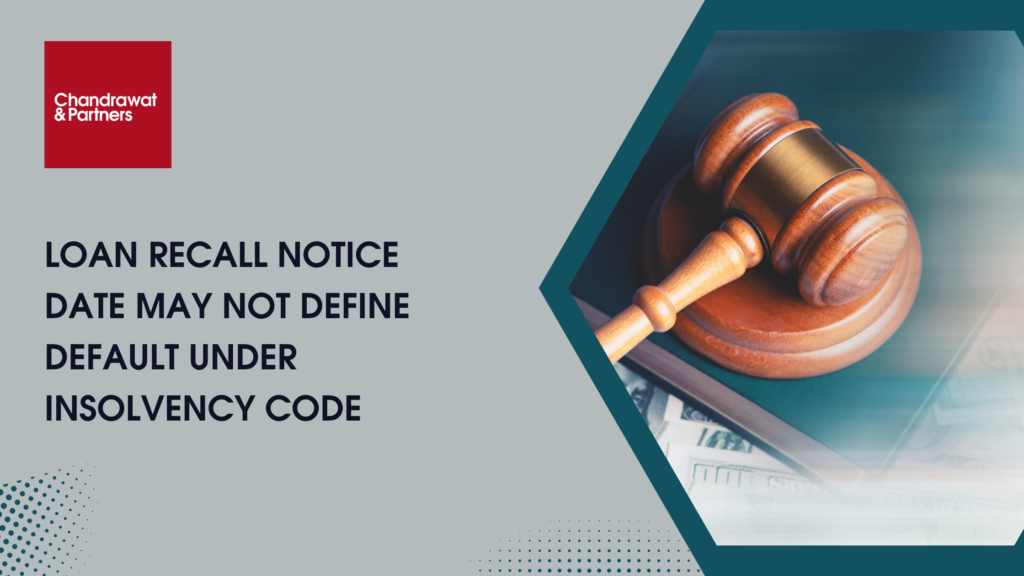Home > Recent Judgements > Loan Recall Notice Date May Not Define Default Under Insolvency Code
August 14, 2024

LOAN RECALL NOTICE DATE MAY NOT DEFINE DEFAULT UNDER INSOLVENCY CODE
The recent judgment by the National Company Law Appellate Tribunal (“NCLAT”) in the case of Milind Kashiram Jadhav vs. State Bank of India (“SBI”) has significant implications in the realm of insolvency law, particularly concerning the determination of default under the Insolvency and Bankruptcy Code, 2016 (“IBC”).
BACKGROUND
The case revolves around the initiation of Corporate Insolvency Resolution Process (“CIRP”) by SBI against Jabalpur MSW Pvt. Ltd. (“the Corporate Debtor”) for defaulting on a loan amount of Rs. 46.8 crores. SBI declared the loan as a Non-Performing Asset (“NPA”) on 27.09.2019 and issued a recall notice on 11.08.2020. The appellant, challenged the admission of CIRP by the National Company Law Tribunal (NCLT) New Delhi, contending that the default date should be the date of the recall notice, and not the date of NPA declaration.
ISSUES
The primary issues before the NCLAT were:
- Determination of the relevant date of default under the IBC.
- Validity of part payments made between the NPA declaration date and the recall notice date.
- Interpretation of Section 10A of the IBC regarding the effect of payments on the default status.
FINDINGS AND RATIONALE
The NCLAT dismissed the appeal and held that the recall notice date cannot constitute the relevant date of default under the IBC. It relied on judicial precedents and the provisions of the IBC to establish that the date of NPA declaration is pivotal in determining default. The tribunal emphasized that the entire debt becomes due and payable upon NPA classification, constituting a default under the IBC.
The NCLAT reasoned that despite part payments made by the Corporate Debtor, the persistent NPA classification indicates ongoing default. It disregarded the appellant’s argument regarding the recall date as the default date and affirmed that concerted efforts to address the default were lacking.
JUDGMENT
Bank’s Duty of Care: The judgment typically assesses the duty of care owed by the bank to its customers. Banks are expected to follow strict protocols to prevent unauthorized access and ensure proper handling of accounts. Any deviation from these protocols can render the bank liable for losses incurred.
Proof of Negligence: For the plaintiff to succeed, they must prove that the bank acted negligently or failed in its duty. This involves showing that the bank’s actions or inactions directly caused the financial loss or distress.
Documentation and Evidence: The judgment would consider the evidence presented, including account statements, transaction records, and correspondence between the bank and the customer. Proper documentation plays a crucial role in establishing the facts.
Bank’s Defense: The bank might argue that it followed all required procedures and that any issue was due to external factors or the customer’s own actions. The court evaluates whether the bank’s defense is substantiated.
Remedies and Compensation: If the bank is found liable, the judgment would determine the appropriate compensation for the plaintiff. This might include reimbursement of the lost amount, additional damages for inconvenience, or other remedies as deemed fit by the court.
Precedent and Legal Principles: The case is often analyzed in light of previous judgments and established legal principles. Courts look at how similar cases have been decided to ensure consistency and fairness.
OBSERVATION
The NCLAT upheld the decision of NCLT New Delhi, affirming the relevance of the NPA declaration date as the default date under the IBC. The tribunal emphasized that partial payments cannot absolve the Corporate Debtor from default status, and SBI is justified in pursuing its claims based on the sustained default status of the loan accounts.
This judgment underscores the importance of timely resolution of default under the IBC and provides clarity on the interpretation of relevant provisions in insolvency proceedings. It serves as a guiding precedent for future cases involving similar issues, contributing to the jurisprudence surrounding insolvency law in India.
For more information or queries, please email us at
enquiries@chandrawatpartners.com




